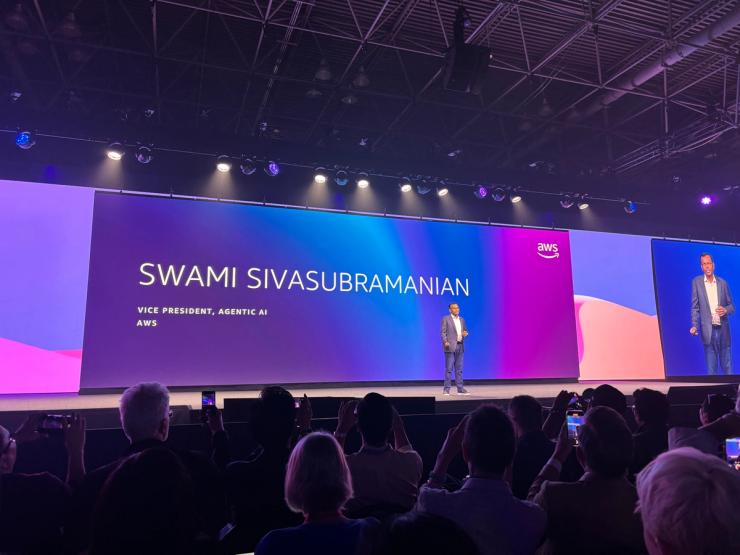The News
Amazon Web Services on Wednesday launched a platform to help businesses build a web of connected AI agents to analyze internal data, write code, and take on other tasks, freeing up employees to do more creative and strategic work.
The customizable service, called Amazon Bedrock AgentCore, is being rolled out at a time of high anxiety among employees about job cuts because of AI, with Ford CEO Jim Farley saying earlier this month that the technology would replace about half of US white-collar workers.
The Amazon platform, announced by the company’s vice president of agentic AI Swami Sivasubramanian at its AWS Summit in New York, is a preview of how AI agents will soon become commonplace at the office. They can run in the background for up to eight hours, and they support the popular MCP and A2A protocols, allowing them to communicate with other agents outside of a company.
“AgentCore is this next big step from building agents for fun to entire organizations switching to agentic AI, which has the potential to be as transformative as the internet,” Deepak Singh, vice president of developer agents and experiences, told Semafor.
In this article:
Know More
Amazon’s announcements follow similar product launches from competitors Microsoft, Google, and OpenAI. Those services, however, primarily support agent-building on their own models or a limited set of models, while AWS says its agents can work with any framework or model, including those outside of Bedrock.
At the New York event, Amazon also launched a dashboard that lets employers track how their agents are performing and a marketplace where developers can buy and sell agents.
Whether the average worker is ready for that transformation is another question. Roughly 80% of American workers don’t use AI in their jobs, and more than half of people feel worried about the technology entering their workplace, according to a Pew Research Center survey from February.
“All of the production agents are not going to show up tomorrow, but people are already building this, and they’re hand-rolling a lot of it right now,” Singh said. “AgentCore is making the transformation possible.”
Rachyl’s view
The workforce transformation is one that’s been promised for a while and will likely have an incredible impact on productivity. But critical components are still missing: education and buy-in from the lowest levels of organizations.
The argument from Big Tech executives is that the technology will make workers’ lives easier, so why wouldn’t they adopt it? That may be true, but it also requires every employee, including the tech-challenged and tech pessimists, to experiment with agents enough to reach their personal aha moment. Education could fill the gap — imagine training videos or workshops hyper-specific to automating personal workflows — but that’s not Amazon’s job, and many businesses lack the time and bandwidth to create programming.
It’s one thing to sell the product and another for it to be used. The software is here, but the behavioral shift required to adopt may not be. Until companies invest in educating their workforces, even the most powerful tools risk gathering dust on the desktop.
Room for Disagreement
A McKinsey & Company report from earlier this year found that employees are more ready for the change that comes with AI integration than companies give them credit for. Three times more employees are already using generative AI in their work than their business leaders expect. Meanwhile, the C-suite is more likely to blame employee readiness as a hurdle than their own strategy and rollout, McKinsey found.
Notable
- Amazon itself expects to see a reduction in workforce as more AI and agents are used to automate routine and repetitive tasks, CEO Andy Jassy said last month.
- China is also investing in developing homegrown AI agents, and it’s quickly catching up to the US with models like Alibaba’s Quark and Manus, Rest of World reported.


